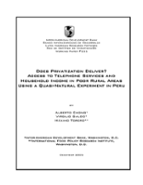Does Privatization Deliver?: Access to Telephone Services and Household Income in Poor Rural Areas Using a Quasi-Natural Experiment in Peru
Date
Dec 2005
This paper takes advantage of a quasi-natural experiment in Peru by which the privatized telecommunications company was required by government to randomly install and operate public pay phones in small rural towns throughout the national territory. Using a specially designed household survey for a representative sample of rural towns, it is possible to link access to telephone services with household income. It was found that, regardless of the income measurement, most characteristics of public telephone usage are positively linked with income. Remarkably, the benefits occur at both non-farm and farm income levels. Not only do the findings hold when using instrumental variables, but they are also further confirmed when using propensity scores matching methods.



